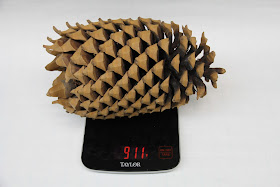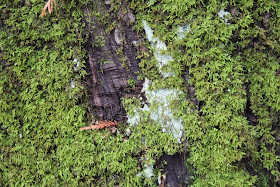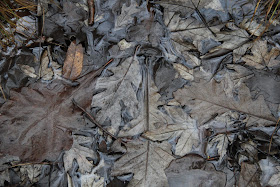Yesterday, my scheduled presentations were cancelled due to a scheduling conflict. This meant that for the first time since September, I had a day in the office with no scheduled presentations. Normally on a day like that I try to get outside and spend some time with my camera, but the weather was drab and dreary, with flat light and gray skies that make photographs drab and dreary. Instead i took a little bit of time to focus on a project that has been on my mind for a while.
Being someone who teaches about nature and science, I tend to collect things. A quick survey of my desk reveals 10 rocks, 5 fossils, 2 pieces of petrified wood, two jars with bugs that I really should pin, and other assorted odds and ends.
Here is another collection - cones.
With the exception of the large cone in the back, these five cones were all collected in Michigan. Only two are native to the state. From the front to the back these cones are the Giant Sequoia , Eastern White Pine (left), Jack Pine (center), Norway Spruce (right), and Coulter Pine.
The smallest cone of the bunch, the Jack Pine (
Pinus banksiana) was collected at a park in Mt. Pleasant. This cone is about 2 inches long and a little over an inch across. The Jack Pine is native to Michigan. It can reach a height of about 78 feet (22 meters), but rarely grows that tall due to poor soil conditions across much of its native range.
This Jack Pine cone weighs in at just 7 grams (0.247 ounces).
The other Michigan native in this bunch is the Eastern White Pine (
Pinus strobus). This cone was collected at the Brady Cemetery at Forest Hill Nature Area in Gratiot County. It measures approximately 5.5 inches long and 2.25 inches across. It weighed in at 17 grams (0.600 ounces). Some White Pines that were logged during the 19th century were reputed to measure 230 feet (70 meters) tall!
The Norway Spruce (
Picea abies) cone was collected from a tree in the parking lot at the Isabella Conservation District Office. This Norway Spruce is not native to Michigan but has been extensively planted throughout the state. This cone measures about 5.5 inches long and 1.75 inches across. So far it is the heaviest cone of the bunch at 34 grams (1.199 ounces). Norway Spruce trees have the capacity to reach a height of 185 feet (55 meters).
The giant of the bunch is the dried cone from the Coulter Pine (Pinus coulteri). This enormous cone measures approximately 11 inches long and six inches across and weighs 911 grams (32.135 ounces)! That's just over two pounds - the cones can weigh as much as eleven pounds when fresh. Coulter Pines are found in coastal mountain ranges of southern California. I purchased this cone at a rock and mineral show in Michigan.
The final cone is the one from the Giant Sequoia (
Sequoiadendron giganteum). This cone measures about 2.25 inches long by 1.5 inches across. It weighs 21 grams (0.741 ounces). I collected this cone from beneath a
Giant Sequoia tree at the Lake Bluff Audubon Sanctuary near Manistee, MI.
So why am I showing this pipsqueak of a cone last?
Because the seeds from this cone have the potential to grow into the largest living organism on earth. The largest Giant Sequoias have been measured at 311 feet tall (94.8 meters) with a trunk diameter of 56 feet (17 meters)! They are also among the oldest living things on the planet, with some examples estimated to be over 3,500 years old!
The lesson is, don't judge a book by its cover or a tree by its cone.


















































